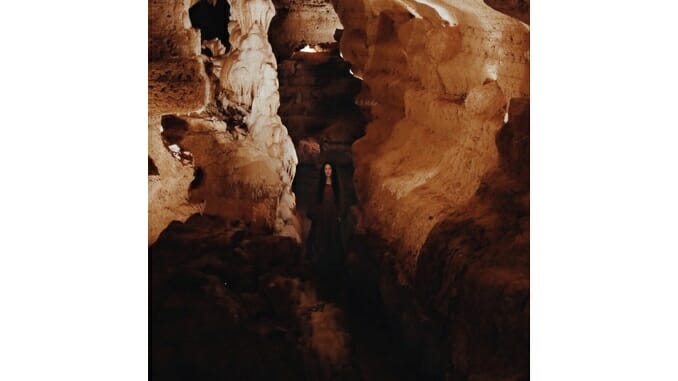Zola Jesus Finds Resolve Amid Uncertainty on Arkhon
In her vastest music yet, the Slavic-American art-pop musician walks through the fires of turbulence and emerges a more balanced person

As increasingly more people have accepted that climate apocalypse, unaccountable and draconian legislative bodies, ruling class wealth consolidation, endless mass shootings and other nightmares may be less worst-case scenarios and more our present and future reality, increasingly more people have retreated from political engagement into uneasy surrender. It’s hard to feel excited about voting when one major political party’s promises range from empty to just a sanitized version of the literal Nazi party’s economic views; it’s tough to envision a bright future when a never-ending pandemic, a potential World War III and Christian fascist legal victories are part of a year literally pronounced “2020 too.” It’s easy to look into our terrifying future, accept defeat and live in some sort of half-aware, half-okay-half-not trance, doing just enough to make it to the next day.
On Arkhon, the Slavic-American art-pop musician Nika Roza Danilova, aka Zola Jesus, stares into the great unknown and finds resolve. Her sixth album (and first in five years) feels primed for this era: Its blackened gloss and booming drums evoke power amid turbulence, as do her ever-sweeping vocals—which mix operatic primality with pop heft—and her lyrics about continuing onward as everything around you crumbles. On some songs, unexpected tempo shifts—which are new for Danilova—reflect the sudden return of that existential dread you’ve been trying to suppress.
Doom looms overhead throughout Arkhon, but instead of giving into the pressure, Danilova walks through the fires of uncertainty and emerges a more balanced person. Her music finds more grounding in tandem: Her most organic-sounding drums to date give these songs some breathing room as compared to the crushing darkness of 2017’s Okovi. The result is her vastest music yet, a cavernous sort of middle ground among orchestral, Gothic, pop, opera and industrial music that feels apt for barreling through obstacles both global and personal.
Danilova faced unusually severe writer’s block while writing Arkhon, so she brought in Fiona Apple-affiliated percussionist Matt Chamberlain and Sunn O))) collaborator Randall Dunn to help sculpt the LP’s sound. Their contributions imbue these songs with adrenaline, life and horror. The album’s percussion is especially responsible for how sharply the music evokes simultaneous upheaval and strength, though Zola Jesus records have always sported daring percussion. Danilova’s lo-fi noise debut, 2009’s The Spoils, kicked off with a tractor-trailer of an industrial drum machine, and 2010’s “Night” slowed a techno beat into an addictive stomp. Arkhon is distinct in that its percussion clearly comes from actual drums, rather than machines.
Highlight “Sewn” grows into a glorious clusterfuck of drum kits battling it out with what sound like dinosaur-sized triangles (yes, triangles). As Danilova’s manipulated vocals ricochet off all the thwacking, she sounds like she’s belting her way to safety from inside a tornado: She doesn’t need words to convey her fortitude. The percussion elevates her explicit messages of self-empowerment, too: On “Into the Wild,” Chamberlain starts pummeling right as Danilova reaches the most anthemic parts of her register and sings about jumping into the unknown. “Drop in / Till the walls fall / ’Cause every step is yours / Into the wild,” she commands, singing as much to us as to herself. She stands at the ledge, and her musical collaborators help her take the leap.
-

-

-

-

-

-

-

-

-

-

-

-

-

-

-

-

-

-

-

-

-

-

-

-

-

-

-

-

-

-

-

-

-

-

-

-

-

-

-

-








































